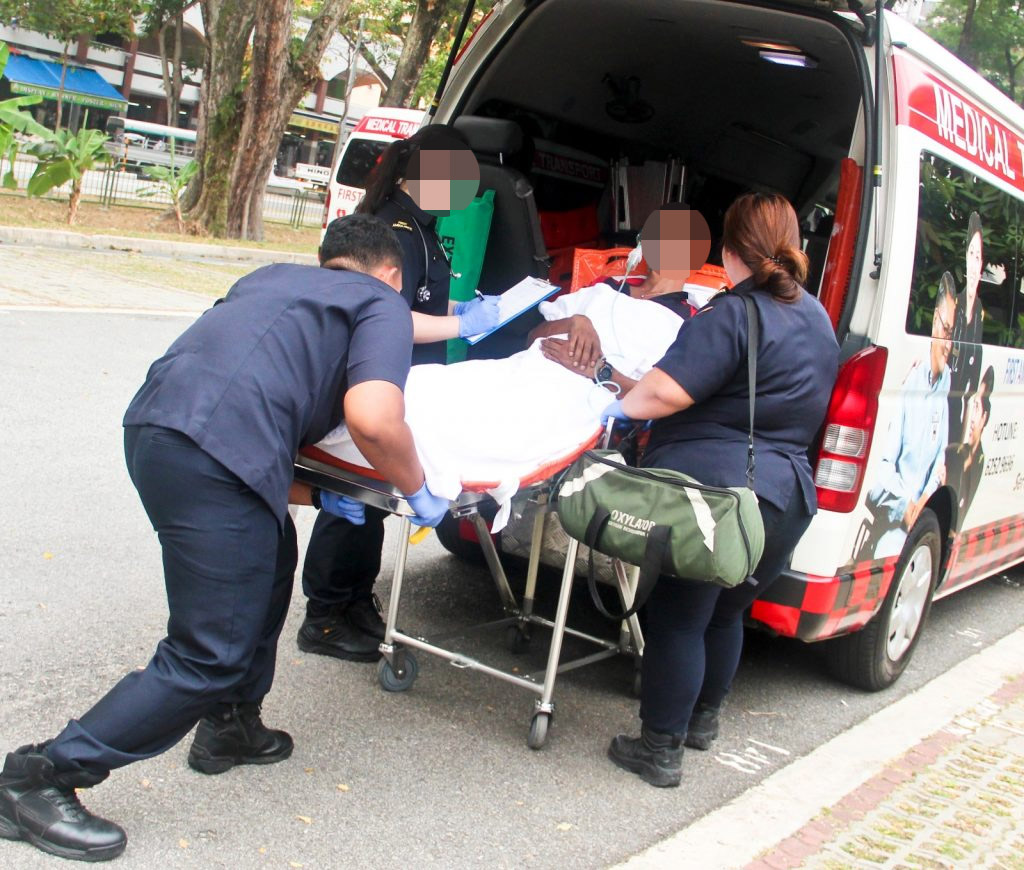55-Year-Old Patient Suffers Head Injury After Stretcher Collapses, Later Passes Away
Transferring patients, be it from one ward to another or between hospitals, can be a heavy responsibility. Sometimes, even the most minor blunder can result in catastrophic consequences.
In Jun 2018, a heart attack patient was being transferred from Khoo Teck Puat Hospital (KTPH) to the National Heart Centre Singapore (NHCS) when the stretcher he was on gave way.
 For illustration purposes only
For illustration purposes only
Source
The man later died due to a heart attack and bleeding in his brain.
Even though his head did not hit the ground directly, a senior neurosurgeon said it likely contributed to bleeding in the patient’s head.
Patient visited hospital due to chest pain
On 17 Jun 2018, Mr Razib reportedly visited KTPH after experiencing chest pain.
The 55-year-old was later diagnosed with having suffered a heart attack and went through procedures, but the situation didn’t improve.
A medical team from NHCS – in Singapore General Hospital (SGH) – was then brought in to aid his heart function using a life support machine.
After midnight, Mr Razib was due to be transported to NHCS. However, during the transfer, the life support machine indicated that its battery was running low.
Without any way to charge the battery, the machine went flat just as they arrived at SGH, reports Channel NewsAsia (CNA).
Despite that, Mr Razib’s condition reportedly remained stable and his pulse could still be felt.
Portion of stretcher supporting patient’s head collapsed
Mr Razib was then unloaded from the vehicle with the help of ambulance drivers and other NCHS staff.
However, the stretcher’s collapsible wheels did not extend and click into position.
The KTPH porter, who was supposed to assist the stretcher’s unloading, could not come along in the ambulance.
It unfolded that the stretcher wasn’t unloaded appropriately, causing the collapse — so said State Coroner Kamala Ponnampalam.
The portion of the stretcher supporting Mr Razab’s head then struck the floor, even as his body was still secured on the frame.
There was reportedly no direct strike on the ground.
Afterwards, the 55-year-old was transferred to the critical care area — where the life support machine was powered up again.
He was subsequently transferred to a surgical ICU about 2 hours later, at around 2.15am.
A CT scan later found that he had bleeding in his brain as well as “evidence of significant swelling and damage”.
Mr Razib’s condition was expected to deteriorate, and his family eventually decided to cut off the life support.
The 55-year-old passed away within an hour, reports CNA.
Bleeding from brain likely caused by stretcher collapse
An autopsy later found that Mr Razib passed away due to a heart attack and bleeding in his brain.
Independent medical experts found that the life support machine’s battery going flat during the transfer did not cause nor contribute to Mr Razib’s cause of death.
On the other hand, another senior neurosurgeon confirmed that the fall from the stretcher played a significant role – or 95% – in causing the head injury.
He also said that the blood clot in the patient’s brain was the factor which “tipped everything over”.
Coroner rules incident as medical misadventure
On Tuesday (13 Apr), the coroner ruled that Mr Razib’s death was a medical misadventure, reports CNA.
She also found that the head injury sustained caused Mr Razib’s condition to worsen, ultimately causing his death.
She advised hospitals to have a look into the incident and make changes to their guidelines which will prevent similar incidents from happening.
The coroner also ruled out foul play and said it’s difficult to tell if Mr Razib would have made a “good recovery”, given his poor health.
Hope hospitals will relook patient transfer guidelines
Our condolences go out to Mr Razib’s family and those who were close to him. We hope he’s in a better place without any pain or sufferings.
It would appear that a series of events – such as the porter from KTPH not being able to follow along in the ambulance – led to the stretcher’s collapse.
Moving forward, we hope hospitals will re-evaluate their guidelines pertaining to the transfer of patients so that such incidents can be prevented.
Have news you must share? Get in touch with us via email at hello@mustsharenews.com.
Featured image adapted from Facebook and RMJM.

Drop us your email so you won't miss the latest news.











